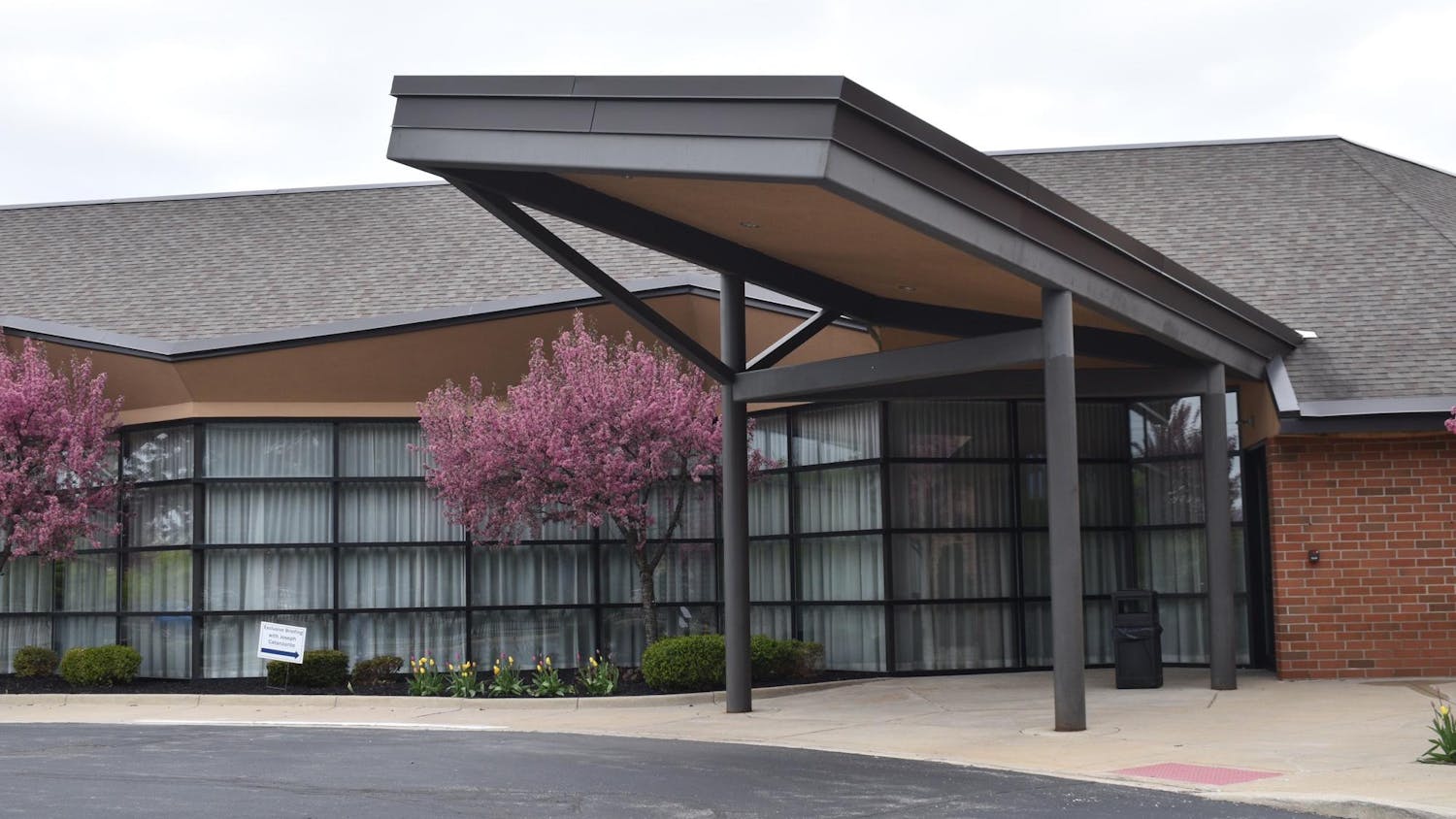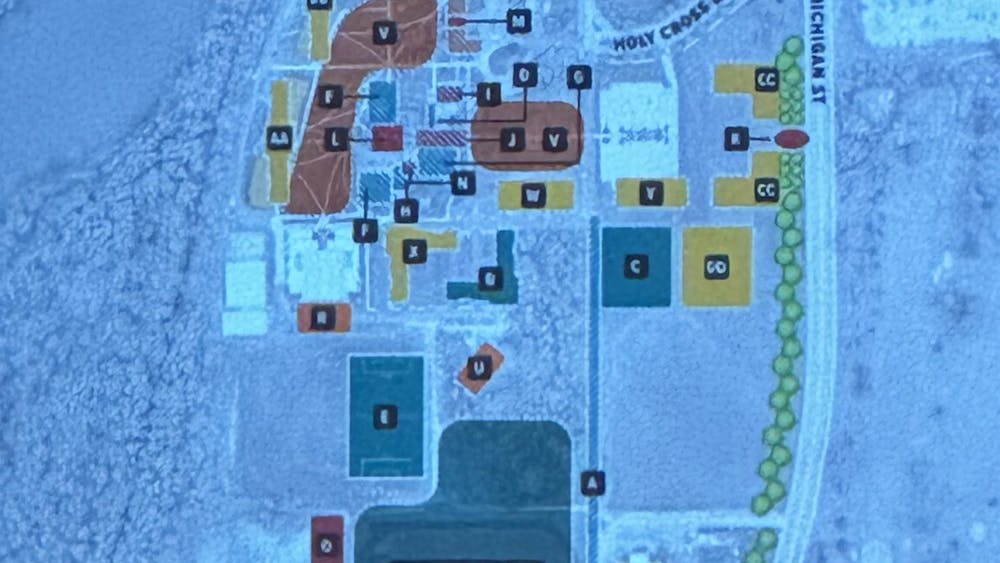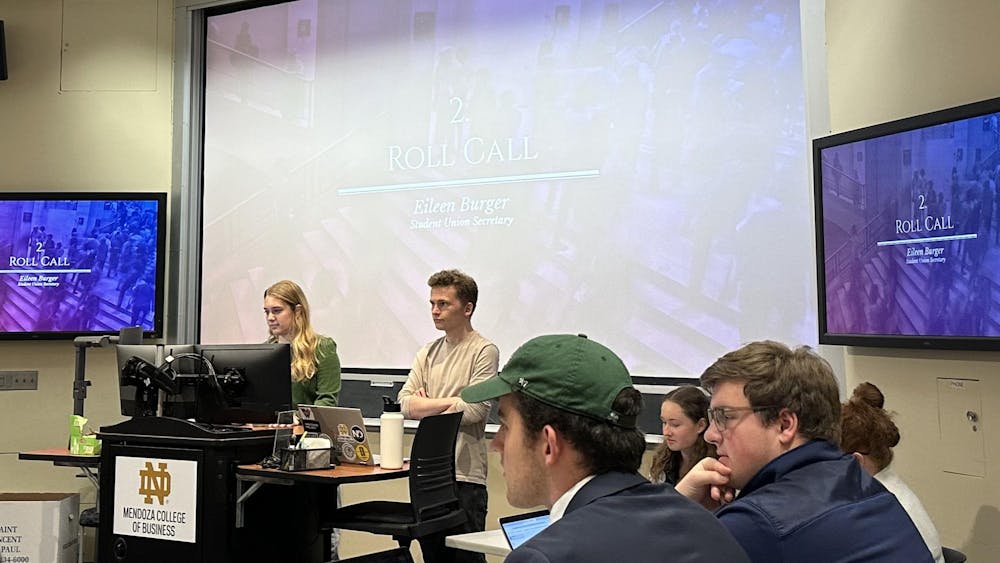University President Fr. John Jenkins lives by two important words: faith and reason. Those principles, he said, informed his at-times controversial decisions, and will continue to guide him into his second term.
Reflecting on his first term as University President, Jenkins said it's difficult to be under the media microscope while working to clearly communicate the goals of a Catholic university.

"We live in a time where there are a lot of voices out there and it's hard in the midst of that to speak over all the noise," Jenkins said in an interview with The Observer. "I think that one of my roles is to articulate what we are."
Most recently, last spring's controversy over the invitation to President Barack Obama to receive an honorary degree at Commencement and the football coaching change this fall have thrust the University, and Jenkins, into the spotlight.
"I think you try always to do the thing that's best according to your deepest principles, whether eyes are on you or not, you still do that," he said. "There's a lot of noise and a lot of attention, but in the end it's really simple: you just try to do what's best, what accords with the mission of Notre Dame."
Adhering to that mission is one of the challenges for Jenkins as University President, a position he did not foresee himself holding.
‘A series of steps in life'
"I didn't see myself doing this, and it wasn't a driving ambition of mine," Jenkins said. "It was a series of steps in life that led me here and led me to this."
Graduating from Notre Dame with a degree in philosophy in 1976, Jenkins was drawn to the priesthood and was ordained in 1983.
"I think with that there's always an element of mystery. I've always felt that desire for something of depth, something meaningful in my life."

That search for something more led Jenkins to "think deeply about faith and about God" and about what he was going to do with his life.
"That eventually led me to think about serving people as a priest, someone who strives to bring Christ to people," he said.
After attending graduate school at Oxford and serving on the faculty at Notre Dame, Jenkins moved to the Provost's Office. In 2004, he was elected president to succeed University President Emeritus Fr. Edward "Monk" Malloy.
Jenkins said his studies in philosophy have helped him perform the duties of the Office of the President. He tells his students philosophy is "just thinking hard, thinking clearly" about important issues.
"I always found them to my mind the sort of profound issues of life, of human life … and I genuinely enjoyed grappling with those issues … it just resonated with who I was," he said, "and that's what we do every day."
Every day challenges
"My challenge every day is time," Jenkins said. "You have all these pressures and people demand your time, so it's always a struggle."
Serving as president of a university is a balancing act, he said. Daily meetings, traveling and full schedules leave little time for anything else.
Though Jenkins no longer interacts with students in the classroom as professor, an aspect of his life he says he misses, "nothing is more important than keeping in touch with the students."
"It is one of the joys of my job to talk to students and I try to make that a part of what I do," he said.
Jenkins' biggest challenge, however, is a positive one: "to live up to a mission that is distinctive in higher education and to realize the tremendous potential of Notre Dame in the 21st century."
Jenkins said there are three important aspects to Notre Dame's goal: to provide unparalleled undergraduate education, to be a preeminent research university and to let the Catholic mission "inform everything we do."
"If we do all three, Notre Dame can make contributions to society and the nation and the Church that is really unique," he said. "And my passion in this job is to make that contribution and to help Notre Dame make that contribution."
These goals will carry into Jenkins' second term as University president, he said. "You always have to keep striving — if you're not striving, you're falling backwards."
He said he hopes progress toward achieving those goals is part of the legacy he leaves behind on the University, as well as making Notre Dame an important venue for debate on "important issues," even if they're controversial.
"I hope Notre Dame can be a place where we can have those kinds of conversations and can engage people who are the leaders of our nation, the influential people of the world," Jenkins said. "The University particularly should be a place that's open to a diversity of views, even views that challenge us."
Jenkins' decisions in the past, including inviting President Barack Obama to receive an honorary degree from the University, have drawn criticism from Church representatives, including John D'Arcy, former bishop of the Fort Wayne-South Bend Diocese.
While he believes "the bishop has a role in the diocese of teaching the faith" and that it's important that he, as University president, personally remains close to the bishop, Jenkins said some decisions belong to the University.
"It's appropriate the University should make those decisions, as best we can on the principles that guide the institution," he said. "I'm committed to working with the bishop to help Notre Dame, to help Notre Dame serve the Church and serve the diocese."
A Catholic university for the 21st century
Jenkins said establishing these relationships — with the Church and with national leaders — and working toward achieving the University's central goals, puts Notre Dame in a unique position.
"The thing about Notre Dame, we're sort of inventing a Catholic university for the 21st century," he said. "There have been great Catholic universities, but history has changed, society has changed, universities have changed."
Undertaking the challenge to create the new Catholic university depends on Jenkins' guiding principles, drawn from his studies in philosophy and his calling to the priesthood.
"I think a Catholic university is the institutional expression of a confidence in the harmony of faith and reason — that's why we exist. If we didn't believe that, let's just shut the doors and go home."
The two are not in conflict with each other, but rather inform every aspect of Notre Dame, he said.
"There's nothing more central to us. That means, the inquiring mind in the search for truth and all the challenges that involves along the way is not in conflict with a faith in God," Jenkins said. "It is precisely that confidence in that harmony and the strength of the Catholic faith — that's the reason why Notre Dame exists."
The coming weeks will bring the most rewarding part of Jenkins' presidency: conferring degrees on graduating students.
"Every graduation is my proudest moment, just to send people off to see how they've grown," he said. "That's why we're here. They're going to do great things in the world after being at Notre Dame, and that's a great accomplishment."












